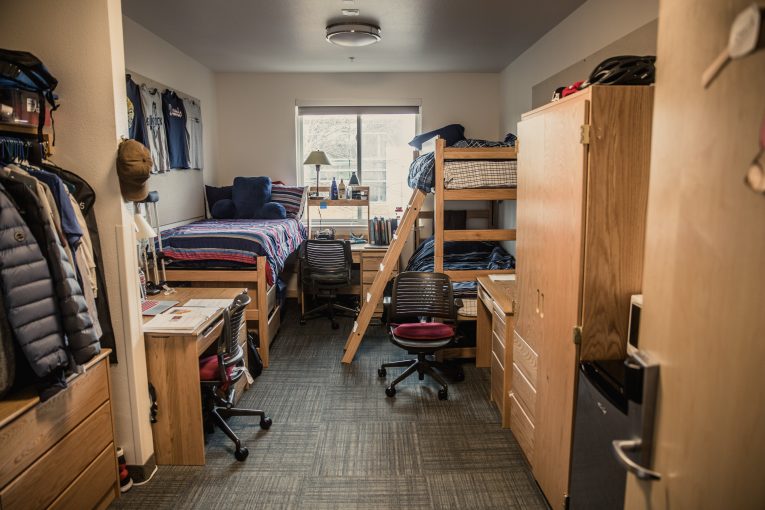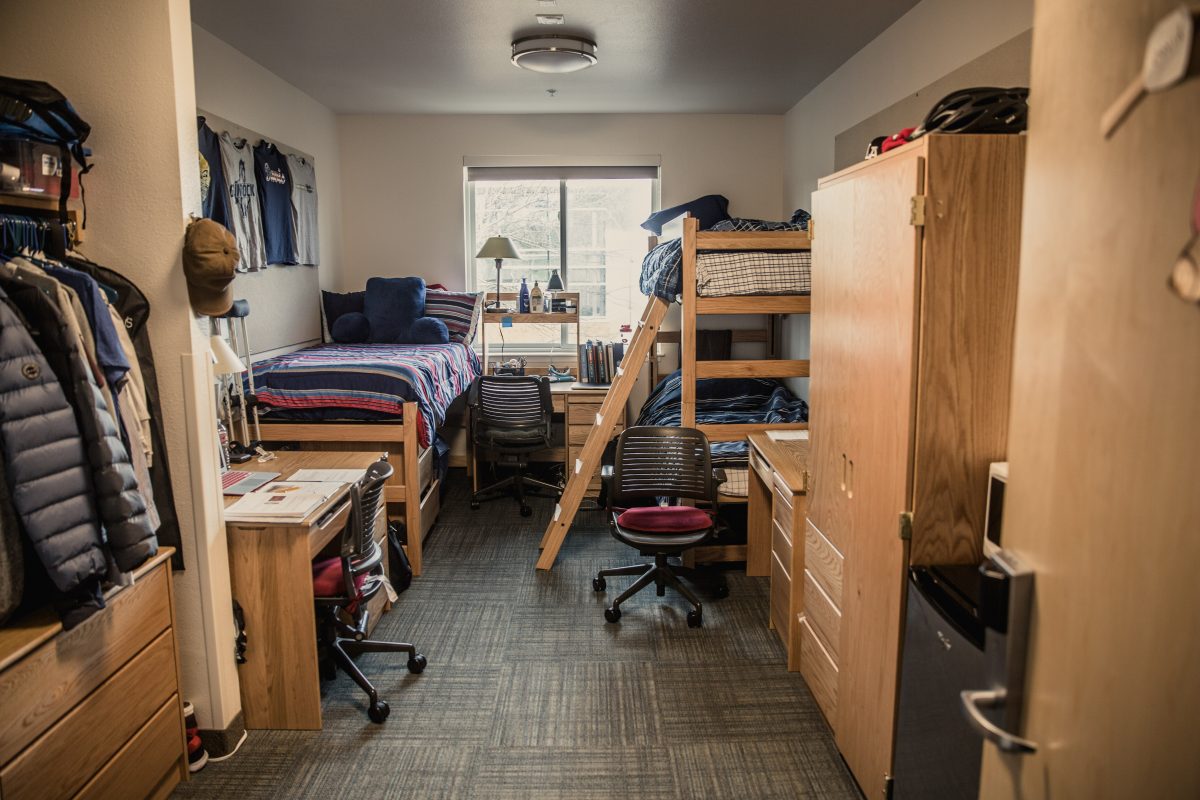

By David M. Greenwald
Executive Editor
It doesn’t sound so bad—four UC campuses so short on housing that they are putting up students in hotel rooms this fall. This has been used to provide temporary housing to at least hundreds of students, according to a story from CalMatters this week.
It may not sound that bad, but there are some downsides.
“But the financial support campuses offered varied. And for many students, finding more permanent, affordable housing remains elusive, even as the end of fall quarter nears,” CalMatters reports.
At UC Merced students were expecting to move into a brand new student apartment building, but construction delays held up the opening of the private student apartment complex, leaving 500 students at UC Merced without housing.
“In hotel rooms paid for by the university, Saldana and her roommate took turns studying or eating on the one desk,” CalMatters reported.
But it was not an extended stay, so there was no kitchen—which meant the students could not prepare their own food.
Moreover, “the hotels had to make room for non-student guests who already had reservations.” As a result, “the university assigned her to three different hotels in a span of 11 days. The constant moving affected her studies.”
The student they featured eventually found a room to rent off campus, “But her experience reflects that of thousands of students across the UC system who were eager to return to campus life this fall after a year of online learning during the pandemic and found themselves scrambling to find housing. Unable to secure dorm rooms or afford pricey off-campus apartments, some ended up in unconventional housing — local hotel rooms.”
According to the story, at least four campuses have offered a hotel option, temporary relief for hundreds of students.
But for many, “finding more permanent, affordable housing remains elusive, even as the end of fall quarter nears.”
“Affordable housing has long been an issue for California’s public universities. In 2020, 16% of UC students lived in hotels, transitional housing or outdoor locations because they didn’t have permanent housing,” according to a report from the state’s Legislative Analyst’s Office.
The Legislative Analyst’s Office issued a report on November 8 to Assemblymember Kevin McCarty, who chairs the Subcommittee on Education Finance.
Since 2015, CSU has added 14,300 beds while UC has added 21,700 beds, that is 36,000 new beds. Despite that, more than 16,000 students at the University of California and California State University were on waitlists for housing this fall.
“For fall 2021, eight UC campuses report waitlists totaling more than 7,500 students. Some campuses report increases over pre-pandemic levels, whereas others report substantial reductions,” the LAO reported.
According to the article, the UC Merced students who had been living in hotels have since moved to apartments or on-campus housing, but UC Santa Barbara, UC San Diego and UC Santa Cruz also have students housed in hotels rather than permanent living.
For example there are 280 students at UC Santa Barbara staying at 10 different hotels contracted by the university—down from 350 earlier in the quarter.
This is not a good deal for the university. The students are paying $26 a day for the accommodation, the same amount they would pay for a double-occupancy space at a university-owned apartment while UCSB is covering the remainder, approximately $175 a day.
But really the students are not getting a good deal here, even if they are staying in a $200 a night hotel room for just $26.
They don’t have permanent space, hotel rooms are not set up for student accommodations, and food has to be a problem—although the article really did not focus on the issue of food.
Santa Barbara, already under fire for the mega-dorm—Dormzilla—a proposed 4500-bed building, right now is dealing with a shortfall of student beds and at a recent townhall they said they will be extending their hotel contracts into winter for those who need them.
“At this point, we are looking to prioritize moving the students who are in hotels into campus housing. Our intent is that anyone who is currently in a hotel will receive an offer of either campus housing or an extended hotel contract into the winter quarter,” Mario Muñoz, associate director of Residential and Community Living said.
It appears to be worse at San Diego.
CalMatters reports, “While UC Santa Barbara is subsidizing the cost of hotel rooms for students, and UC Merced paid the entire bill plus shuttle service and grocery store cards, students who resort to hotel living at UC San Diego must pay their own way.”
Four Marriott hotels near La Jolla offer UCSD students discounted rates for long-term stays, and a university spokesperson estimated about 20 students were staying there.
The publication reported, “For example, students can book a room at the Residence Inn San Diego Del Mar for $169 per night. But even that discounted rate works out to about $5,000 per month. Students who stay 90 days or more at that hotel can pay as low as $125 per night. UCSD spokesperson Leslie Sepuka said the university does not pay students’ hotel bills, but they can apply for a one-time subsidy to cover part of the cost through the school’s Basic Needs Hub.”
“While hotels might be nice for the amenities, they’re not a feasible option for low-income students and those who don’t get financial support from their families, said UCSD sophomore Kida Bradley.”
“It’s like putting a Band-Aid on a bullet wound,” Bradley said.
Finally, UC Santa Cruz is also using 60 rooms at a local Best Western to house graduate students.
“The monthly rate of $2,700 includes continental breakfast. Students pay what traditional on-campus graduate student housing costs — $1,247 a month — while the university subsidizes the rest. Like other students housed in hotels, the graduate students have nowhere to cook meals.”
As we reported last week, the state legislature, finally recognizing the student housing crisis across the state, is stepping in.
They have committed just $500 million so far to student housing—a start, but a figure that pales in comparison to actual need.







This is more about poor planning and lag timing in construction at California college systems. Pretty much par for the course. That’s why when that bubbly young voice from the alumni association calls every year to scrape a contribution from me, I tell that voice to send up the food chain that they’ll get a contribution when the U gets their S together and also abolishes public employee unions from campus. The usual reaction is: “Huh?”
Not sure if the reason that David is focusing on this CalMatters article today has anything to do with the following quote I cited from it, yesterday:
In any case, this belief is part of the problem. Students, parents, and society itself believing that this is the purpose of college.
And those who believe it (and are there for the “experience”) are competing for space on campus and for housing with those who actually need to be there.
Sometimes, from two different socio-economic classes of people, as well – with the “fun” crowd coming from wealthier families, who can more-easily afford the cost of tuition and housing.
Man, that’s some bad customer service. I think those students should write some negative Yelp reviews for those schools. Those students should probably think about going to a school that provides better/more affordable housing option. If students can’t get their tuition back for crappy service and poor housing options then some legislation needs to be implemented to allow them to do so.
The first paragraph appears to be misworded, in regard to the bolded word “student”. It appears that the universities are paying the difference, not the students.
It would be interesting to know what fund are they using to pay these costs, and what impact that has on the universities. And, what the total costs are (for all of the universities discussed in this article).